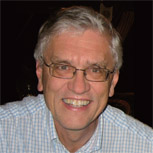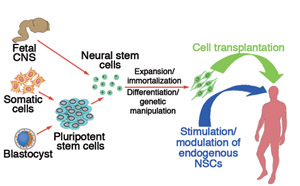HOME > Program Members > Olle Lindvall

Olle Lindvall

Professor, Lund Strategic Research Center for Stem Cell Biology and Cell Therapy, Lund University
Olle Lindvall, MD, PhD
Theme
Development of stem cell-based therapies for functional restoration in the diseased human brain
Our main aim is to use grafted and endogenous stem cells to repair the brain affected by injury or disease. Before clinical application, we must be able to control proliferation and differentiation of stem cells into specific cellular phenotypes and prevent tumor formation. Functional efficacy of stem cells and their mechanisms of action should be demonstrated in animal models with pathology and symptomatology resembling the human disease. We must understand how to influence the pathological tissue environment including inflammatory and immune reactions to allow for efficient repair. The specific objectives of our research are: (1) To develop effective cell replacement therapy for functional restoration using transplantation of dopamine neurons generated from stem cells in patients with Parkinson's disease; (2) To develop stem cell-based strategies to repair the brain after stroke, and to improve functional recovery by neurogenesis from endogenous stem cells; (3) To determine the various actions of inflammation on neurogenesis after brain insults.
Research activities
We have pioneered cell replacement strategies in the human brain and been the first to show (i) that transplanted dopamine neurons can survive for at least 10 years in the Parkinson's patient's brain; (ii) that the transplanted cells can restore the production of dopamine in the patient's brain to normal levels; (iii) that the graft can restore the activation of frontal cortical areas in connection with movements, which probably is of major importance for the clinical improvement; (iv) that the grafts can give rise to clinically measurable improvements and in some cases dramatic functional recovery. Our work paves the way for the development of stem cell therapies by providing proof-of-principle for the idea that dead cells in the diseased human brain can be replaced by new healthy cells by transplantation. We have also demonstrated that stroke triggers the formation of new neurons from neural stem cells in the adult rodent brain, and provided the first evidence that these neurons can replace those neurons which have died after a brain insult leading to extensive neuronal death.

Selected Paper
- Lindvall O, Brundin P, Widner H, Rehncrona S, Gustavii B, Frackowiak R, Leenders KL, Sawle G, Rothwell JC, Marsden CD, Bjorklund A (1990) Grafts of fetal dopamine neurons survive and improve motor function in Parkinson's disease. Science 247: 574-577.
- Piccini P, Brooks D, Bjorklund A, Gunn RN, Grasby PM, Rimaldi O, Brundin P, Hagell P, Rehncrona S, Widner H, Lindvall O (1999) Dopamine release from nigral transplants visualized in vivo in a Parkinson's patient. Nature Neuroscience 2: 1137-1140.
- Arvidsson A, Collin T, Kirik D, Kokaia Z, Lindvall O (2002) Neuronal replacement from endogenous precursors in the adult brain after stroke. Nature Medicine 9: 963-970.
- Jakubs K, Nanobashvili A, Bonde S, Ekdahl CT, Kokaia Z, Kokaia M, Lindvall O (2006) Environment matters: synaptic properties of neurons born in epileptic adult brain develop to reduce excitability. Neuron 52: 1047-1059.
- Li J-Y, Englund E, Holton JL, Soulet D, Hagell P, Lees AJ, Lashley T, Quinn NP, Rehncrona S, Bjorklund A, Widner H, Revesz T*, Lindvall O*, Brundin P* (2008) Lewy bodies in grafted neurons in subjects with Parkinson's disease suggest host-to-graft disease propagation. Nature Medicine 14: 504-506. *, senior authors.
Copyright © Keio University. All rights reserved.
